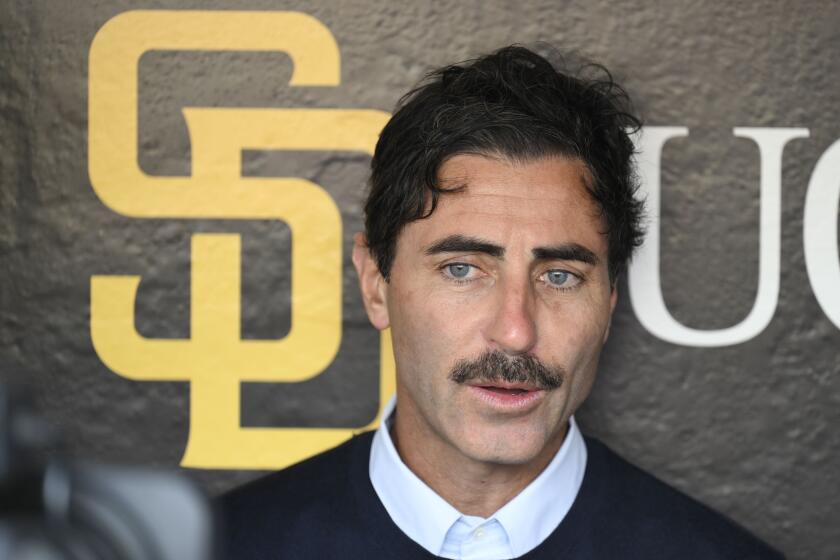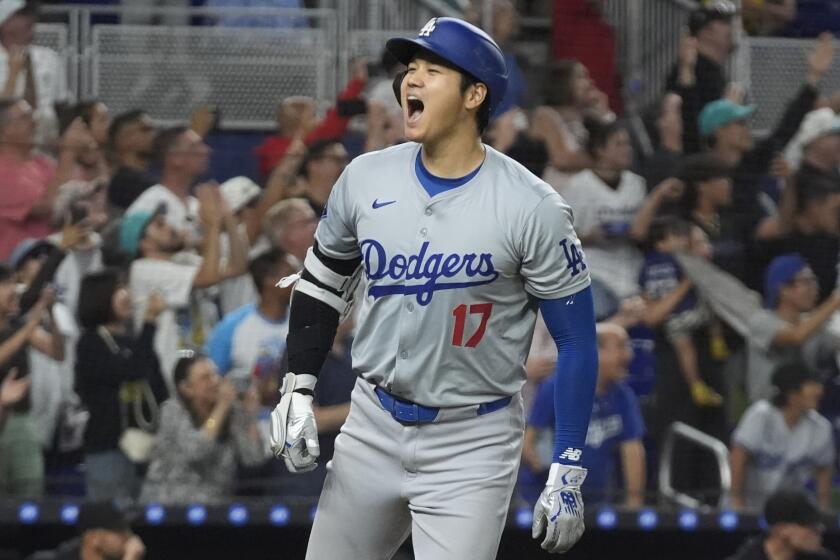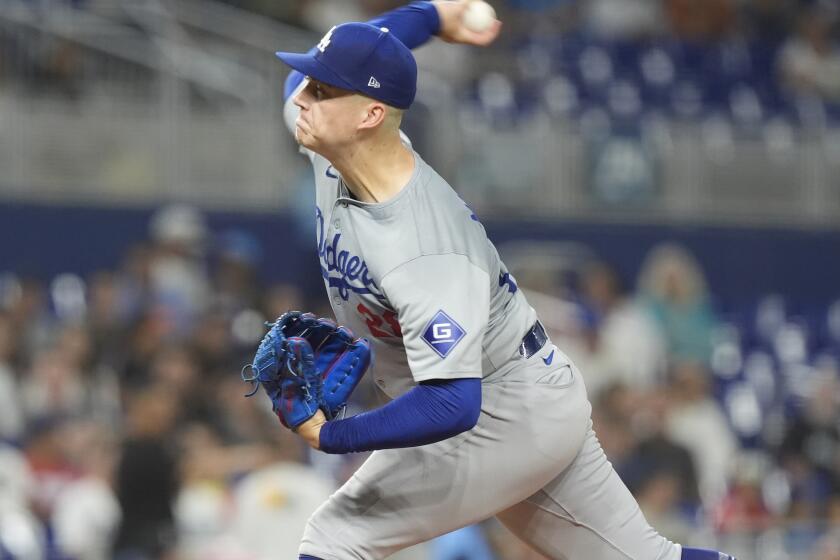Dodgers’ Buyer Covering All the Bases
The way his closest associates explain things, Frank H. McCourt Jr.’s plans for the Los Angeles Dodgers are clear enough: He is determined, in the words of one, to put “the polish back on the Dodger brand.” Plain and simple.
Yet some leaders in the L.A. business community refuse to believe that McCourt’s agenda is about baseball and baseball only.
The fourth-generation Bostonian who struck a deal last month to buy the Dodgers from owner News Corp. for $430 million is, after all, a real estate developer. And that fact alone is enough to have the city establishment clucking over what McCourt’s real motive for purchasing the team may be.
“There has to be some other, ancillary play,” said Los Angeles developer Rick Caruso, whose projects include the Grove at Farmers Market.
Like others in town, Caruso finds it hard to imagine that someone would buy a team that is reportedly losing millions of dollars a year without a strategy for generating new sources of revenue, probably through the business he knows best.
With that in mind, Caruso figures that McCourt’s endgame could be to build housing adjacent to Dodger Stadium atop the 300-acre parcel on Chavez Ravine. Others surmise that McCourt may move the Dodgers from their longtime home and into a new stadium that would be built downtown.
McCourt, under a gag order from Major League Baseball, has said little publicly.
But those familiar with the 49-year-old’s track record say that, whatever his ultimate plans, he is bound to let them unfold slowly. That, they say, is because McCourt has learned from experience the importance of handling major undertakings in person and building community support before taking potentially controversial steps.
It’s also because, unlike Microsoft Corp. billionaire Paul G. Allen and some other big-league sports owners, McCourt doesn’t have money to burn. His core asset is an undeveloped, 25-acre parcel on the South Boston side of the Hub’s storied waterfront -- a piece of property that Boston broker Gary Lemire of CB Richard Ellis/Whittier Partners values at $200 million. Others put the value higher.
McCourt held lots of meetings during a recent trip to Los Angeles, but some skeptics think he hasn’t found the partners or secured the financing needed to complete his acquisition of the Dodgers. McCourt has countered by putting out word that he’s fully capable of doing the deal on his own and has no worries about winning approval this month from other baseball team owners.
One well-wisher told McCourt that he began with at least one advantage: He isn’t News Corp. Indeed, McCourt is playing up the theme that the Dodgers are returning to family ownership. His early embrace of longtime owner Peter O’Malley perhaps was meant to underline that idea.
At the same time, McCourt is sending another clear signal by moving to Los Angeles. McCourt and his wife and business partner, Jamie, are house-hunting and scouting schools for the younger two of their four sons, Casey, 17, and Gavin, 13.
McCourt, according to people close to him, plans to open a West Coast office of McCourt Co., his Boston-based development firm. To that end, he dispatched his older sons, Drew, 22, and Travis, 20, to the Southland over the summer to gather information on the regional economy.
With his three brothers and three sisters all living in the Northeast, McCourt will hardly sever ties to the area. Yet he has raised the prospect of finally giving up the piece of property that has defined him as a businessman. He announced late last month that he had hired a broker to find potential buyers or development partners for some or all of his harbor-side acreage in South Boston.
Identifying, buying and defending that site have occupied most of McCourt’s career.
In 1977, at age 24, he left the family business, McCourt Construction Co., to open his own firm. After a couple of modest residential rehabilitation projects, he made a deal that year with bankrupt Penn Central Railroad to buy what was then an eyesore: an old train yard with a few decrepit, trash-filled buildings. The price was $3.5 million.
As McCourt moved toward a year-end 1980 deadline to close on the purchase, he arranged with Penn Central’s permission to have the buildings torn down and the land cleared and graded. Suddenly, anyone with a harbor-view office could see the site for what it was: a big blank slate for development with easy highway, train and airport access, all within a five-minute walk of the downtown financial district.
Some of the biggest names in real estate quickly moved in, offering to buy out the young entrepreneur or become his partner. McCourt’s struggle to keep control wasn’t brief, and it wasn’t always gentlemanly. For example, during the New Year’s Eve 1980 closing on the property in a plush Boston law office, a rival developer launched himself across a conference table at McCourt and threatened in colorful language to throw him out a window, one eyewitness recalled. Cooler heads intervened and the deal went forward.
Agreements signed that day gave rise to a marathon court battle. It was not until 1994 that the legal smoke finally cleared, and McCourt emerged with clear title to the land -- now worth many times its original price.
The list of McCourt’s defeated litigation opponents includes Toronto’s Reichmann family, owners of Olympia & York; Hartford, Conn., developer David T. Chase; and Chicago’s Marshall Field family, owners of Cabot, Cabot & Forbes.
The experience left McCourt determined to hold the reins tightly on future deals, say people close to him. Thus, these people say, even if McCourt teams up with better-known partners on the Dodger deal, he’ll clearly be the man in charge.
The rap against McCourt from some hometown critics is that he has repeatedly announced big plans for his South Boston land but has done little more than operate commuter parking lots on it.
Douglas Lemle, owner of the Barking Crab, a waterfront restaurant adjacent to McCourt’s property, calls McCourt “a gremmie,” a term from Lemle’s youth on the beach in Honolulu.
“A gremmie’s a guy who sticks his board in the sand and waits for the big one and never surfs,” Lemle said.
There’s bad blood between the two dating from a 1997 incident when McCourt began towing unauthorized cars of Barking Crab customers from one of his lots. Lemle retaliated by posting a sign directing complaints to McCourt’s home phone, resulting in a barrage of angry late-night calls.
Although McCourt has moved slowly in South Boston, it’s hard to argue with the results. Besides the income from his parking lots, McCourt has reaped nearly $90 million in fees and court awards from state agencies involved in vast and complex construction projects on his doorstep. A soon-to-open convention center and subway line can only enhance the site’s value.
Despite sparring with popular Mayor Tom Menino, McCourt has cultivated a strong political and community network around Boston. Away from home, however, his magic touch sometimes has deserted him.
In his wife’s hometown of Baltimore, McCourt refurbished a large building in the trendy Inner Harbor, opening several restaurants and nightclubs to great local fanfare in 1989. But the place closed nine months later amid friction between McCourt and the entertainment firm he had hired to operate the facility.
McCourt and his investors took a $30-million bath. The lesson he apparently took from the debacle was never again try to run a business by long distance.
A few years earlier, McCourt had secured a large waterfront parcel in South Portland, Maine, announcing ambitious plans for office and retail development, condominiums, a marina and parkland. Ultimately, faced with grass-roots opposition and a slowing economy, all he finished were the condos and marina, letting options on the rest of the land expire at a loss.
Former South Portland town manager Jerre Bryant believes that McCourt failed to adequately win community support. He never could shake the tag of a big shot from Boston with no feel for local concerns, Bryant said.
McCourt did better advance work for his unsuccessful 2001 bid for the Boston Red Sox. His bid was contingent on moving the team from venerable Fenway Park to a new stadium he would build on his South Boston site.
Support was hardly unanimous in insular “Southie,” but McCourt won praise for showing up at neighborhood hearings and otherwise touching all the political and community bases.
McCourt is already well into his Los Angeles networking.
Among the potential Dodger partners he is wooing is Beverly Hills money manager Bobby Turner. Turner, who declined to comment, is a managing partner of Canyon Capital Realty Advisors, which manages more than $4.5 billion in assets through a series of real estate funds that provide capital to property owners and operators.
One such fund is the $300-million Canyon-Johnson Urban Fund, which owns the Transamerica Center in downtown Los Angeles and 5.5 acres of adjacent land between the landmark 32-story tower and Staples Center. Canyon-Johnson, whose partners include former Los Angeles Laker basketball star Ervin “Magic” Johnson, has put “for sale” signs on its property by Transamerica Center. No asking price has been set.
The four-block area bordered by 11th Street and Pico Boulevard and Hope and Olive streets has been considered by planners and developers to be a large part of a potential site for a football or baseball stadium -- adding to the speculation that McCourt may have more in mind in Los Angeles than simply getting his spring-training roster in shape.
Such conjecture doesn’t come in a vacuum. Los Angeles developer Alan Casden, who made a failed bid for the Dodgers, said last summer that he wanted to raze Dodger Stadium, erect housing in Chavez Ravine and relocate the team to a new home near Staples Center.
“Certainly, a portion of the Dodgers’ assets are in real estate,” said developer Steve Soboroff, president of Playa Vista. “The issue is how -- after the team is stabilized and the community feels like it’s back in good hands -- do you deal with that asset?”
The door to negotiate for a downtown stadium, meanwhile, remains wide-open. “A baseball stadium in downtown L.A. would have as big an economic impact as Staples Center has had,” said Tim Leiweke, chief executive of Anschutz Entertainment Group, which owns Staples Center and other adjacent property. Some form of partnership with Anschutz would almost certainly be required to build a new ballpark near Staples.
“We’d do anything we can to help” McCourt make the switch, Leiweke added.
More to Read
Are you a true-blue fan?
Get our Dodgers Dugout newsletter for insights, news and much more.
You may occasionally receive promotional content from the Los Angeles Times.











